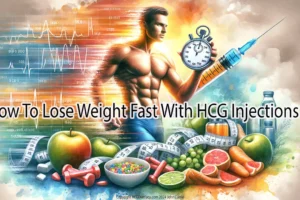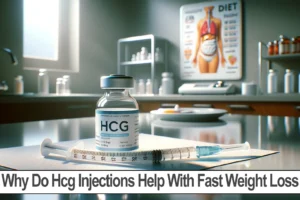Understanding the Primary Aspect: HCG Injections for Weight Loss
The Human Chorionic Gonadotropin (HCG) diet is a weight loss protocol that involves taking HCG hormones, typically through injections, and maintaining a low-calorie diet. The HCG hormones are naturally occurring substances in the human body, produced in large amounts during pregnancy. Advocates of the HCG diet believe it can stimulate the metabolism, suppress hunger, and thus, facilitate weight loss.
The Components of the HCG Diet
The HCG diet comprises two integral components: HCG injections and a low-calorie diet.
HCG Injections
The HCG injections typically involve doses of 125 to 200 IU per day. The exact dosage varies depending on various factors like the individual’s specific weight loss goals, overall health, and doctor’s recommendations. The injections are often self-administered, but it’s essential to receive appropriate training from a healthcare professional before starting.
Low-Calorie Diet
Alongside the HCG injections, individuals on the HCG diet consume only 500 to 800 calories per day. The diet mainly consists of lean proteins, fruits, and vegetables. It’s a critical component of the diet, as it complements the effects of HCG injections to induce weight loss.
Considerations for Specific Groups
While the HCG diet can be effective for weight loss, it’s not suitable for everyone. Pregnant or nursing women should avoid this diet, as the HCG hormone directly influences the body’s reproductive functions. People with certain health conditions, like heart disease, kidney disease, and liver disease, should also refrain from the HCG diet.
Also, it’s crucial to note that the U.S. Food and Drug Administration (FDA) has not approved HCG for weight loss. The low-calorie intake associated with the diet can lead to malnutrition, heart problems, and other health complications. It’s recommended to consult with a healthcare professional before starting the HCG diet.
Practical Advice on HCG Diet
If you’re considering the HCG diet, follow these tips for the best results and to ensure safety:
1. Consult a healthcare professional: It’s essential to discuss your weight loss plans with a healthcare professional. They can provide you with the correct dosage and instructions for administering the HCG injections.
2. Plan your meals: Preparing your meals in advance can help you stick to the low-calorie diet. Try to incorporate a variety of foods to get a wide range of nutrients.
3. Monitor your progress: Regularly track your weight loss progress and consult with your healthcare provider if you experience any adverse effects.
Using HCG injections for weight loss is a significant commitment that requires careful planning and monitoring. However, with the right approach and professional guidance, it could potentially be an effective weight loss strategy for some individuals.







